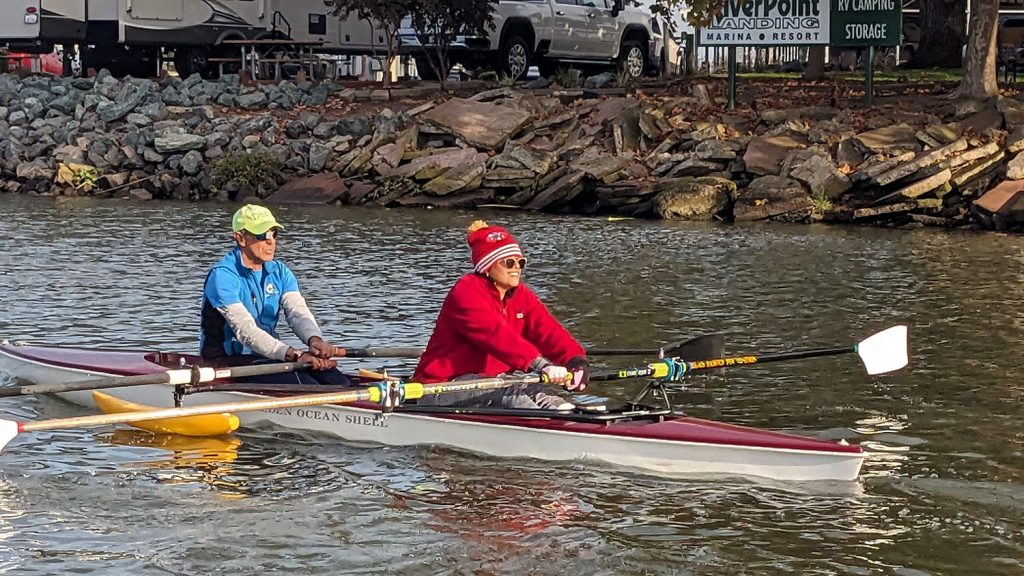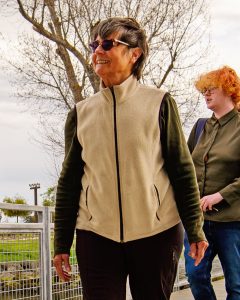Delta Water Recreation: Access Is Everything

Tricia Canton (Photo courtesy of Delta Sculling Center)
Water defines the Delta, and access to water defines people’s connection to the Delta.
For both Dr. Pat Tirone and Tricia Marie Canton, there was no access in the beginning. Their early time as Stockton residents was completely disconnected from the water that flows through the city.
“I lived here for three years and didn’t know the Delta was here,” said Tirone, a physical therapist and graduate of the 2024 Delta Leadership Program.
When she first stumbled onto a city park with water access, she saw not the water and boat ramp that were hidden from view, but a private boat club, and it was unclear whether she even had the right to access the water.
Then she came across a rowing club that was raising money at a shopping center one day. That’s when she learned the public does have access to the water, and that there were ways to enjoy it without buying a power or sail boat or joining an exclusive yacht club.
That launched her into something that would become not just a personal passion, but a professional one: sculling.
Canton’s path was different. Born and raised in Stockton, she discovered her love of water only when she moved to Southern California to attend UC Irvine, becoming an avid beachgoer.
Then in 2014, at the age of 28, she had a ruptured brain aneurysm and three strokes that nearly killed her, leaving the entire left side of her body paralyzed. Her family was told she would probably never walk, talk or even breathe on her own again, and they moved her back to Stockton to take care of her.
This is where both Canton’s and Tirone’s stories would meet.

Pat Tirone
As part of Tirone’s rehab work, she spent much of her time taking her clients into nature, often at Berkeley’s Bay Outreach and Recreation Program, which had an entire barn full of adaptive recreational equipment. But as soon as her clients were discharged from rehab, their access to those opportunities ended.
“My husband listened to me complain that there was nothing like that in our community and finally told me to put up or shut up,” Tirone said. So together they started the Delta Sculling Center in Stockton in 2013, buying boats, renting storage space for them, and acquiring gear needed to adapt to rowers’ various needs.
“Rowers joined us as volunteers, and all a sudden we had a whole program,” she said.
Canton learned about Delta Sculling Center in 2022.
Being immunocompromised, she had been confined to her home since the beginning of the Covid pandemic, and her rehab stopped during that time. As the pandemic was receding, her doctor told her about a program that teaches people with disabilities to row, and that’s when she contacted “Coach Pat.”
The Sculling Center had a way to compensate for poor grip in her left hand: a Velcro connection to the oar, and a handle that would release if the boat turned over so the connected oar wouldn’t drag her down. The Center also had gear that would help her climb into the boat. And of course, volunteers who would row with her.
She used her arms more in her first session than she had the entire time since the aneurysm, and rowing has increased her endurance and strength. Just last week, she set a new personal record: 7 km on a day when her goal was 5.
But it’s about more than that. “On land I have to worry about gravity, other people, and the terrain – if it’s slippery, if there’s an incline, if there’s gravel, if there’s sand,” she said. “On the water, I’m just free.”
Beyond that, nature is endlessly delightful, a chance to encounter ducklings growing from one outing to the next, sea lions swimming near the boat, herons threatening to “drop bombs,” or the rush of dozens of blackbirds lifting from a powerline all at once.
And then there are the local landmarks, like the miniature Statue of Liberty at the confluence of the San Joaquin and Calaveras rivers. Canton rowed there recently with Tirone’s husband Bob, and they spontaneously sang God Bless America.
Experiences like these are what Pat Tirone cherishes about her time on Delta waters as well. “The other day, I was out rowing by myself and the sound of all the birds at 6 in the morning was just overwhelmingly beautiful,” she said. “I just turned the recorder on my phone on, laid it down on the deck of my boat and captured their beautiful music. In the middle of Stockton! What a gift.”
All people need to be able to connect with this gift – the water that is the lifeblood of the Delta – is access.
Learn more about:
- The Delta Sculling Center. The center is a non-profit whose mission is to provide inclusive rowing opportunities to people of all abilities. Tagline: “Where EveryBODY Sculls,” and “EveryBODY” includes adults of all ages, military veterans with disabilities, and middle and high school aged youth, especially those who come from under-resourced parts of the region.
- The Delta Aquatic Center. The Delta Sculling Center has been instrumental in the development of the Delta Aquatic Center of Stockton project, a new facility in Stockton that would increase access to the water for the community. A $2.5 million grant from the Delta Conservancy is funding planning for the project.

